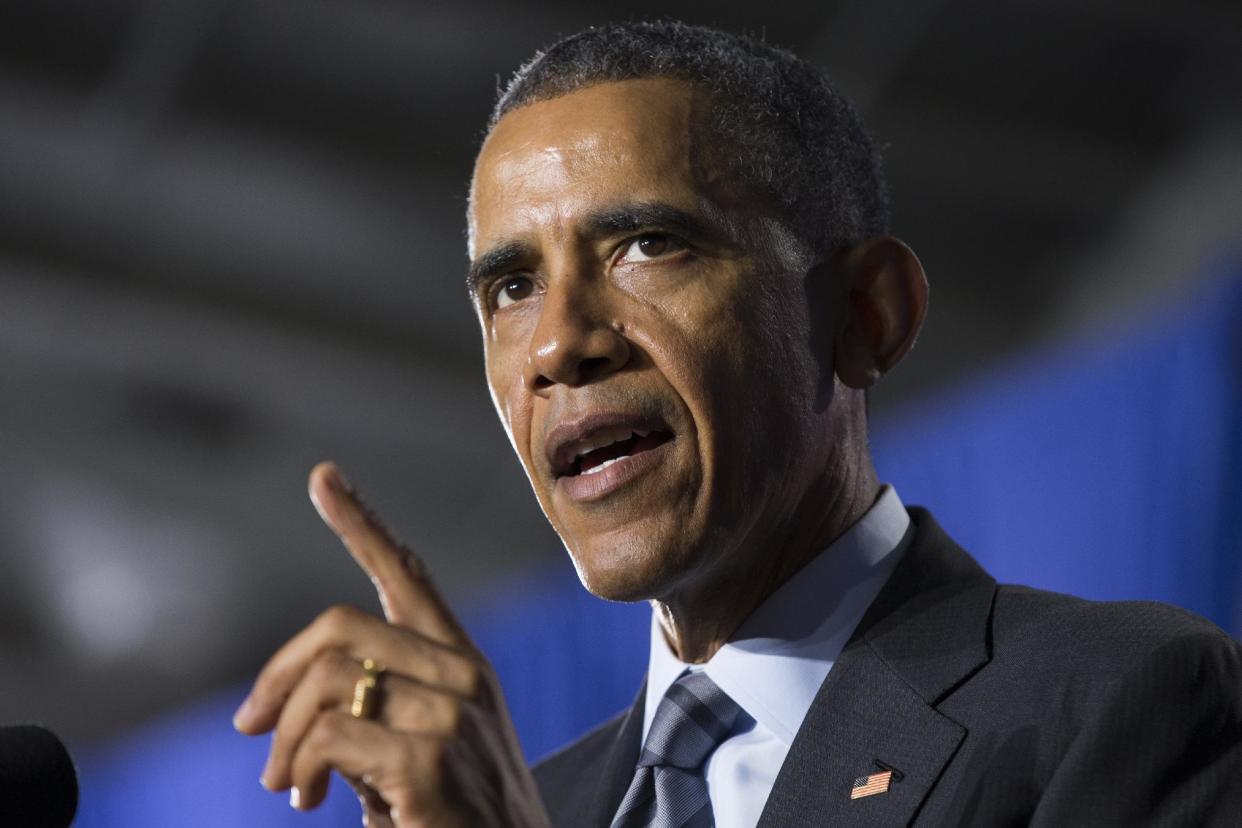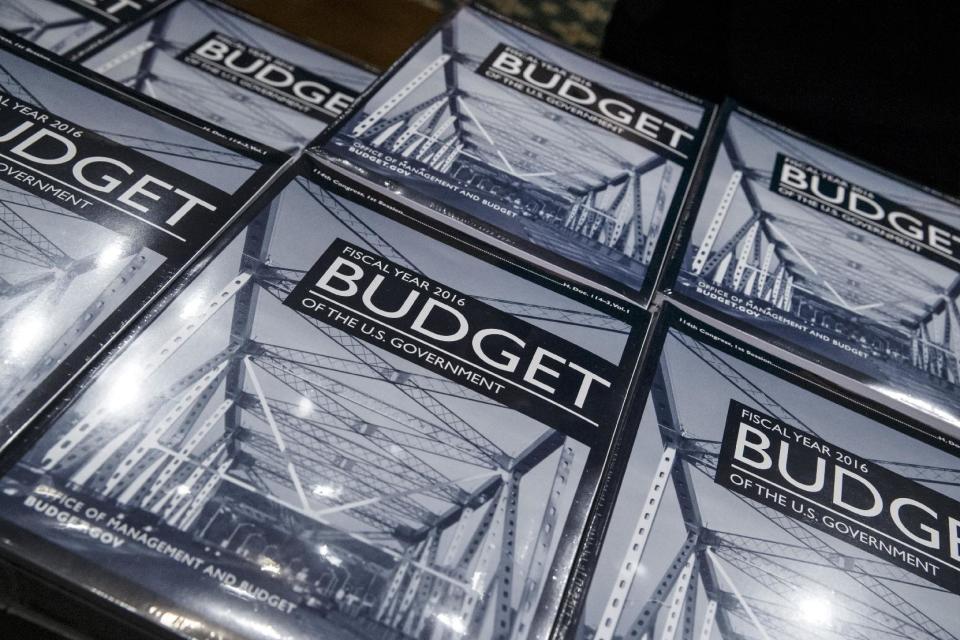Breaking down the Obama budget
The annual presidential budget released Monday isn’t just about top-line spending. It’s about creating political separation between the president and the GOP

President Barack Obama’s $4 trillion budget, like every president’s, is a purely symbolic wish list of policy items the administration would pursue in an ideal political world, one in which his party controls everything and faces no ideological opposition. But it also serves as a key mission statement that allows him to frame the political debate for the next year and leading up to the 2016 election, when his party hopes to maintain control of the White House without him. This year, Obama is using the annual Washington ritual to tout his crusade on behalf of what he calls “middle class economics.” For Republicans, the president’s budget represents the year’s juiciest target.
Yahoo News breaks down the most important provisions in the budget, and how the parties reacted to those measures.
Easing away from austerity policies: Perhaps the most notable aspect of Obama’s 2016 budget is that it ignores the spending caps imposed by Congress in 2011 as part of a deal that allowed the government to continue to pay its bills while slashing spending across the board, for both military purposes and domestic programs. Republicans had reclaimed control of the House in 2010 on a message of reducing the federal debt and cutting spending, which Democrats argue actually slowed economic recovery over the past five years.
Republicans have long opposed the military spending cuts implemented as part of the across-the-board savings they helped enact in 2011, and they aim to reverse those cuts in 2015. In boosting spending levels by $75 billion above the agreed-to caps — including $40 billion in increases for domestic programs like Head Start and universal preschool — the White House is sending two messages. The first, to the general public, is that the president does not believe that austerity is the best economic policy; and the second, to the new Republican majority in the Senate and expanded majority in the House, is that the president does not support rolling back military cuts without also increasing domestic spending.
What Democrats are saying: House Democratic Leader Nancy Pelosi of California: “We must have an economy that works for everyone, not just the privileged few. By ending the sequester, by addressing the wage stagnation that hinders growth, by strengthening our national defense, by investing in innovation and education, the president’s budget strengthens the financial security of working families who are the backbone of our country.”
What Republicans are saying: Senate Majority Leader Mitch McConnell, R-Ky.: “What we saw this morning was another top-down, backward-looking document that caters to powerful political bosses on the left and never balances — ever. The new Congress will focus on ways to help the middle class instead as we work to pass the serious kind of budget all Americans deserve: one that roots out and reforms wasteful spending, and that aims to grow middle class jobs and opportunity instead of Washington’s bureaucracy.”

The ever-elusive goal of comprehensive immigration reform: One of the most politically charged issues in the run-up to the 2016 presidential election is immigration reform. The GOP is divided on how to proceed, with hard-right Republicans opposing changes of any kind that would allow more immigrants to stay in the United States and more moderate Republicans backing change, in part out of a recognition that the party needs to make inroads with Hispanic voters to have a shot at winning back the White House. Currently, Republicans are fighting among themselves on how to avoid a shutdown of the Department of Homeland Security this month over attempts to defund Obama's actions on immigration. Last Congress, the Senate approved a bipartisan immigration bill, which included prominent GOP co-sponsors such as former presidential nominee John McCain of Arizona, and Marco Rubio of Florida and Lindsey Graham of South Carolina, both of whom are flirting with presidential runs.
And if you read the president’s 2016 budget carefully, you can discern a strong economic argument for why Congress still needs to pass immigration reform: because it would reduce the deficit by an estimated $160 billion over 10 years and $1 trillion over two decades.
The White House claims its budget achieves $1.8 trillion in deficit reduction over 10 years, but that $160 billion total from the immigration bill that died last Congress is baked into that number. It may be wishful counting from the White House to include that figure in its calculations — even Rubio has said the bill has no chance in this Congress — but it’s also a reminder to Republicans that they had an opportunity to move forward on the issue and failed to do so. The White House is able to take that shot while also framing reform in the most politically neutral way: money saving.
What Democrats are saying: “If none of the Republicans like what President Obama has done on immigration, may I remind them that they're in the majority in both the House and the Senate?” Richard Durbin of Illinois, the No. 2 Senate Democrat, said on the Senate floor Monday. “Why don't they roll up their sleeves and go to work and pass immigration reform?”
What Republicans are saying: Nothing. No statement from a GOP leader mentioned immigration — and Republicans are usually quick to point out when Obama is using fuzzy math to claim more savings than he’s actually proposed.
The perennial attempt at bipartisanship known as infrastructure funding: The president’s budget includes a six-year, $478 billion infrastructure proposal that would replenish the Highway Trust Fund, invest in high-speed rail and “repair and modernize” American highways and bridges. Over the past few years, Congress has approved shorter-term patches to the surface transportation bill, which has ensured that money has not run out for projects across the country. Public works funding for transportation projects has traditionally been one of the rare areas of bipartisan agreement, no matter how acrimonious D.C. politics become. Why? Because every district has roads, and constituents who benefit from the jobs created by fixing them. Attempts at bipartisanship in budgets have backfired on Obama before, but transportation funding is usually a safe bet and a place to watch for congressional action.
What Democrats are saying: Top Senate Appropriations Committee Democrat Barbara Mikulski of Maryland: “The president’s budget proposes bold investments in physical infrastructure and our human infrastructure, while continuing to protect our national and homeland security. We need to give middle class families a raise, whether it’s helping working parents afford child care or college. And this budget would help those hard-working families get ahead, not just get by.”
What Republicans are saying: Sen. Roy Blunt of Missouri, a member of the GOP leadership team: “I’m in discussions with my colleagues in the House and Senate to determine the best way forward to address our country’s overall infrastructure needs, as well as specific funding for a multiyear surface transportation bill, and to do so without raising gas taxes.”


